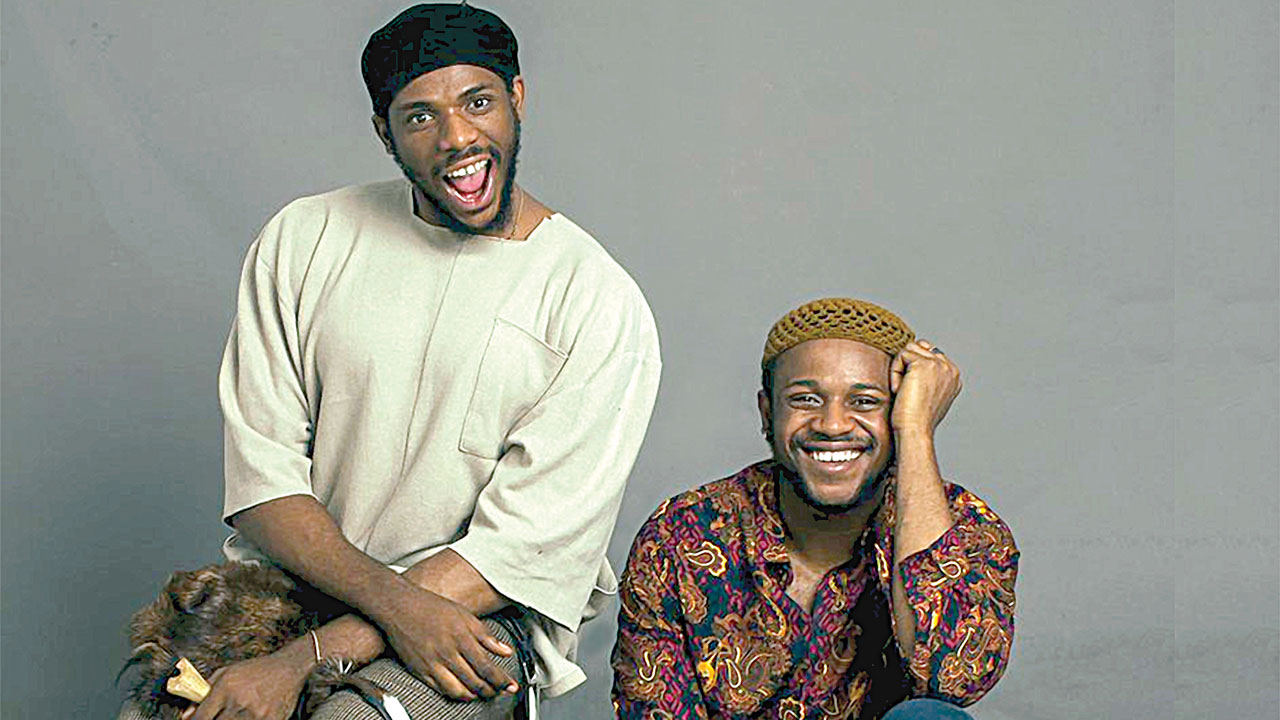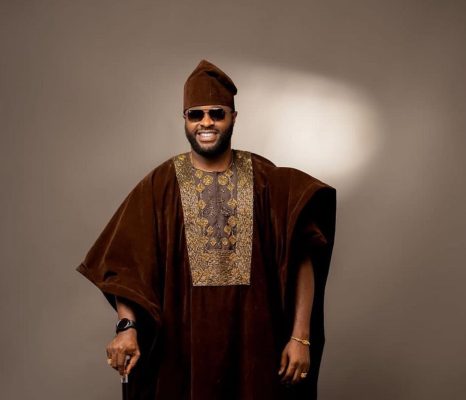
When you hear their name at first, you are struck with curious wonder – The Cavemen? At the turn of the millennia, when the tropical highlife genre started snoozing from Nigeria’s music scene, as the Osadebes, Oliver de Coques and Oriental Brothers, had started bowing out quietly, most Nigerians, especially the Gen-z, became increasingly under-exposed to the iconic sounds of highlife.
Highlife music itself actually began as an unplanned musical experiment by West-African colonial dockworkers in the early 1900s, under the moniker of ‘Palmwine Music’, paying homage to the alcoholic fizzy drink that branded it. Then, it grew over several decades to become a continentally appealing music form, birthing several superstars in the African music industry.
All remained well, until the diverse imports of Hip-Pop, Soul and RnB, among others, caught up with the new age of Afro musicians, with a jar-tight momentum, and Highlife quietly dimmed from the spotlight.
[ad]
However, in the heat of the Coronavirus pandemic, the duo, Kingsley Okorie and Benjamin James – aged 23 and 24 respectively- emerged from the nooks of Lagos to become the messiah of this prestigious genre, reviving the ancestral sound and innovating it to flush with a certain sense of contemporary appeal.
“There are a lot of characteristics associated with the name Cavemen. The creativity in the midst of nothing; the purity; the primitiveness; the colours; everything,” Kingsley, the guitarist and singer, notes as he reflects on the origins of their emerging moniker.
Barely six months after the release of their critically acclaimed debut, a 16-track masterpiece dubbed Roots, the Orlu, Imo State natives emerged winners of the novel Best Alternative Album category, at the 14th Headies award. These musical whiz kids have successfully grown from humble beginnings in a church choir to becoming the leader of the new school of highlife movement.
The Cavemen’s journey is also one of hope. They had first survived a momentary split when Kingsley had to pursue a first degree in Law at Babcock University, Ogun State, and Nigeria’s Law School Kano Campus, respectively, while Benjamin moved to Peter King College of Music, in Badagry, Lagos, to study the art that gripped his heart. It wasn’t until Kingsley returned that the duo was fully baptized into the music industry. They also had to creatively christen their names with a dot, as in ‘Cavemen.’, to avoid lawsuits from a New-Zealand artiste who had earlier trademarked the name.
Roots flourishes easily as a classic, baring a unique sense of sound direction, heavily-laden traditional folk melodies, dramatic falsettos and easy-going introspective lyrics, all of which culminates into an invitation for the listener to re-listen to the project multiple times. The birthmark of Roots is also engraved in its complexity, which is innocently woven with the seams of simplicity. It is a project much loved by both the young and old, creating a confluence of an organic fan-base and a revival of the once-decaying genre; exactly as the brothers once dreamt.
[ad]
Another interesting highlight of Roots is the fact that it was fully produced by the Cavemen, flaunting a unique blend of live instrumentation. Add to that reality is the album has no features at all, and, like the beginning of this story affirmed, you are once again struck with curious wonder.
Maintaining a certain intimacy about their music, the Cavemen deliberately prioritise “energies” above commercial appeal, when choosing collaborations; although they still work frequently with other artistes as both guest singers and producers. For instance, they produced 11 songs from Lady Donli’s Enjoy Your Life album. It was this very same relationship with Donli that had exposed them to a larger fan-base in the ever-evolving Naija music scene. It also bloomed into a marriage of productivity, as she is also a co-executive producer on Roots.
The highlife-singing brothers also revealed that the legendary musician, Cobhams Asuquo, would appear as a guest feature on their sophomore album, which is expected for release later this year. Another curious wonder moment would be the reality that these brothers, despite the impact of their debut effort, have actually concluded recordings for their second and even third album. As a matter of fact, they are currently creating their fourth album!
With their legend growing by the day, Guardian Music catches up with this award-winning duo, in this chat with CHINONSO IHEKIRE, and they spoke on their musical origins; winning at the 14th Headies award; getting inspiration from dreams; recording 40 songs in the Coronavirus-induced lockdown, and resuscitating the waning breath of highlife music.
Congratulations on your victory. How does it feel winning the Best Alternative Album at the 14th Headies award?
Benjamin: That category was very strong. There was Asa, Bez, DRB Lasgidi and many strong people. We are happy; it is great. We have been working on this for the past two years and to see that we are being awarded for it is amazing. It is almost like our tears did not fall in vain; we feel different.
[ad]
How did you two start your journey into music?
Benjamin: We have been playing since; I have been playing drums since I was 2. Kingsley has been playing music since he was 3 or 4; the bond is strong.
Kingsley: It started from the church. We definitely didn’t train anywhere else; it was just all our experiences.
What was your family support, like?
Kingsley: My parents were very supportive; they always give us support in any little way. I remember my first piano; my mum got us our mics and just different things.
So, Kingsley is a lawyer and Ben studied music. When did you both know that you were going to become a duo?
Ben: I think we have always known; we were just waiting for the right time. When Kingsley was in school, we still played together. It is weird; he would call me to Babcock and we would play a gig in Babcock. I wasn’t even in the school at the time. There was no split or solo at any time; that idea still carried through till today.
Why did you guys decide to venture into highlife, even going as far as innovating it into highlife-fusion?
Kingsley: We believe in depth in simplicity. So, highlife in the face of it is simple, but the whole idea behind it is very complicated. It represents what we stand for as Cavemen, and it is definitely what we listened to. We have experiences that suit highlife.
Who were the people you grew up listening to?
Ben: We listened to Osadebe, Oliver de Coque, Onyeka Onwenu, and everyone we could touch. And my father used to be the “secular” guy, because he used to listen to the deep traditional music – the Osadebes. However, my mum used to listen to gospel music. Then, our driver used to listen to Onyeka Onwenu; there was music all around us. These people played major roles.
So, how did you come up with the name Cavemen?
Kingsley: Cavemen comes from a place of purity and self-discovery. I was in Kano Law School and away from civilization. So, I definitely felt like I was in something; I chose to call it the Cave. I came to Lagos and I told my brother about it. So, we decided to stick with the name. There are a lot of characteristics associated with the name ‘Cavemen’ – the creativity in the midst of nothing; the purity; the primitiveness; the colours; everything! There is a particular youthful spirit to the cavemen.
[ad]
You both were separated for a significant period, while Kingsley was in school. Was there any time you both thought about quitting the music?
Ben: No, we have always wanted to do music.
What’s the creative process for making Cavemen music like?
Kinglsey: The sound comes first; it typically comes first, even before the lyrics. Right now, it is weird because we are writing lyrics before sound. I really want to see how that ends. Highlife is sound; highlife is rhythm. Whatever is on top of it, after you get the right sound just works! For us, typically we always get the sound first – whether it is from the dream, or what we listen to. We always get the sound first!
Ben: Just different places – dreams, Jamming, sound check. It could be anything.
Do you mean ‘dreams’, as in when you sleep?
Ben: Yeah! Bolo Bolo that you hear on the album is from a dream; that was my dream. And exactly what I heard in the dream was what we put out. We don’t joke with that. Osondu was from Kingsley. Me, You, I was from mine. It was kind of like that. Most of our songs are from dreams; a majority of them.
Is it true you both do not speak Igbo language?
Ben: We don’t know how to speak very fluently, because we grew up in Lagos. However, we are trying as much as we can to go back to our roots. We are doing the best that we can; but we can’t really speak it, to be very honest.
So, how do you sing all your songs?
Kingsley: The Most High provides; when there is a will, there is a way. When something is meant for you, it is meant for you. I feel like our ancestors and God sees the need to bring back that primitive sound, with the contemporary experience. Yeah, He just provides resources. Osondu was purely original. I wouldn’t have thought of that Igbo on a normal day, but these songs… I must tell you, are inspired.
[ad]
But, if you are being spoken to, do you understand?
Kingsley: Yes, we understand it, but we don’t speak it fluently. Speaking is different from writing. You can write and sing it, but it doesn’t mean that you can sing it fluently. This is as close as we can get to the culture.
So, you both take leads in different songs. Do you have a dedicated Lead singer?
Ben: My brother and I are both lead singers. It is like P-square; there is no lead singer in P-square. We both sing and we are both in front; that is how you should see us.
In terms of content, apart from the melodies, what would you describe as the content you sing about?
Kingsley: Just life. We just sing like we are really in search of something that we don’t even know about. See a song like Beautiful Rain, for example, which young 22 or 24-year-old person would come and sing a song that really says ‘Peel all my flaws, and put out there, when there are people Jaiye Jaiye-ing (partying)? Yeah, it is just life; reality! A lot of songs lift your spirit, because He (God) has done it for us, also. Most of the songs also help us to be sane. I think it is just that transfer that you are experiencing now.
You both are very versatile acts. Is there a possibility of you both exploring or is this niche set in stone?
Ben: Highlife is the base of what we do; we would never neglect that, we would never leave that. If you listen to our music and you pay attention, you would notice that we are quite open-minded with different styles; exploring is definitely an option for us.
You collaborate well with others, how come you guys don’t have any features, but others feature you?
Kingsley: We are very dominating when it comes to music; a lot of people might not really match our kind of energy. So, it is better we come to you, sometimes, when we kind of sense that energy and just match it.
Ben: But the second album has features in them, we look forward to that; Cobhams is on it. Trust me, you would be surprised.
Who again are you open to work with?
Kingsley: We can work with anybody in this world.
So, we can potentially see a Cavemen and Naira Marley record soon?
Both: Yeah, if the energy is right, definitely; that is easy!
It appears you’re still Independent. Why do you prefer this?
Kingsley: It is better; there is nothing like owning your stuff.
Ben: No record label is offering us things that we want; they are offering us things that we already do. We are waiting for something that would surprise us.
[ad]
How was the initial acceptance on a personal basis? How is the love like?
Ben: I mean, it is very different; the owner of my gym is giving me one-month free subscription, and you see that everybody is taking pictures with you. Now, I can’t really go to the gym anymore. The celebrity life is not for us, generally. It is happening, so we have to find a way to deal with it. It is very different.
Does it mean you prefer a secluded life?
Ben: If there was a way of balancing the two of them and have people know me only when I go for shows, not when I go outside randomly, then I would have loved that. I don’t actually like the celebrity life, to be honest. I like to be free and take the street walks, to be honest; but it is a bit difficult.
Let’s talk about your second album, Lady Donli mentioned online that your third album is ready?
Ben: Yes, it is ready.
What about the fourth and the fifth?
Ben: The fourth is in the process.
So, are you dropping the second album this year?
Ben: Hopefully, the second album would be out this year; I can’t tell you when. There are plans towards that, this year.
[ad]
What are we expecting?
Ben: It is a continuation of the first album; we explored a bit more this time. It is going to be cavy and exciting; we are proud of the album. We can’t wait to let it out; expect something amazing.
I also discovered that you produced all the songs on Roots?
Ben: We produced every song on Roots. We produced 11 songs on Lady Donli’s album, Enjoy Your Life.
Is that going to be the same on this album?
Kignsley: Pretty much the same. We are not loud people; we just prefer to stay in the cave. We produce a lot of people, actually, and we would keep doing that.
How do you select the other instrumentalists you work with?
Kingsley: If the energy is right, it works.
Tell us five things we don’t know already about the Cavemen?
Ben: I personally practice almost eight hours a day.
Kingsley: I work out mostly on my mental.
Ben: I go to the gym twice a day
Kingsley: I play the base guitar very well.
Ben: During the peak of the pandemic, we made 40 songs.
[ad]








